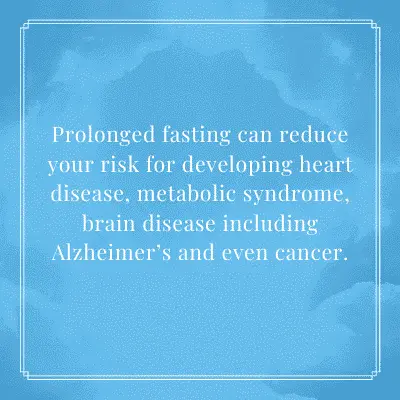Prolonged fasting has been a part of human life since the dawn of time. In the very early days, it was simply a matter of survival. Hunters and gatherers found food where and when they could and didn’t eat when they couldn’t. When farming practices became a little more civilized and food scarcity was limited mainly to times of war or crop failures, religion took over the enforcement of fasting. Almost all major religions in the world recommend some type of fasting throughout the year.
As society evolved, food became more and more plentiful in the rich areas of the world, and religion has gotten a lot more relaxed in people’s lives. While there are still plenty that honor the strict fasting guidelines of their religion, fasting has really only come back into practice in the past decade because of its obvious health benefits.
We’ve realized that what was once thought to be merely a survival mechanism is actually a very important key to having a long and healthy life.
What is Prolonged Fasting?
There are many different ways to fast, but prolonged fasting essentially includes any type of fast that lasts for 3 days or longer, consecutively. During this time you are expected to completely abstain from all food or caloric intake and drink only water for at least three consecutive days.
It is possible to do a prolonged dry fast, where you don’t even drink or have contact with any water, but this increases the intensity and risk of fasting exponentially and should only be done under close medical supervision.
Water is very important for survival. It is generally accepted that humans can live approximately 3 weeks without any food, but only 3 days without water. When you’re fasting for health reasons, it’s good to give your body as much water as it wants and, if you’re fasting for 7 days or longer, you may also want to supplement with electrolytes.
Benefits of Prolonged Fasting
Any type of fasting lasting for 12 hours or more has been shown to have impressive health benefits. Short-term fasting such as intermittent or alternate-day fasting will have greater benefits the longer you commit to a fasting routine. Prolonged fasting, on the other hand, is designed to have a big impact all at once, and not necessarily be repeated again for 6 months to a year.
Of course, by restricting your calorie intake, you are likely to lose some weight during a fast. If you follow your fast with binge eating or poor eating habits, you will probably put the weight back on quickly, however, so if weight loss is your goal, a fast it a great way to kick-start your progress but needs to be followed with healthy dietary changes.
Health Beyond Weight Management
Most people choose to practice prolonged fasting for benefits beyond weight, however. When your body isn’t provided with the energy it needs to survive, a process called autophagy is triggered. This is a natural and very healthy reaction to the new stress of hunger. Throughout your entire body, an ingenious recycling program starts searching for old, damaged or dead cells and breaks them down into their most basic components. These components are reused as building materials for new cells or to repair other cells.
This not only removes waste, helping your body operate more efficiently, but it also reduces the opportunity for disease to form. This process will tackle all sorts of build-ups, including plaque on your arteries and brain and dysfunctional immune cells.
For these reasons and more, prolonged fasting can reduce your risk for developing heart disease, cancer, metabolic syndrome, brain disease including Alzheimer’s and even cancer.
Beyond the physical health benefits, fasting can help build awareness around your eating habits and the power of your body. We live in a world where easy access to food has led us to believe that we need to eat every few hours. Food controls your life. When fasting becomes a regular practice, you regain your control over food and this is not just healthy physically, but also mentally and emotionally.

Is Prolonged Fasting Dangerous?
While extended fasting has numerous health benefits, it does come with certain risks and isn’t suitable for people with certain medical conditions.
First of all, anyone with a history of disordered eating shouldn’t practice fasting, as it can worsen their condition. Similarly, if you’re underweight, prolonged fasting can make it very difficult for your body to get the nutrition it needs to survive. It’s also not wise to restrict calories in growing bodies, which includes children under the age of 18, pregnant women or breastfeeding mothers.
Certain medical conditions also increase the risks of prolonged fasting, most notably type 1 diabetes. If you have a chronic disease, fasting might be able to improve your condition, but it should only be attempted under the supervision and monitoring of a trained medical professional.
Fasting is an incredible way to prevent disease, but if you aren’t careful about your nutrition before and after the fast, you do run the risk of vitamin and mineral deficiencies and muscle loss. A fasting coach can help you properly prepare for a fast to reduce risks and make the experience as empowering and painless as possible.
What happens to your body when you fast for 3-5 days?
At first, you will be almost guaranteed to feel hungry, but if you can survive the first few days, your body will tire of sending hunger signals and it will get much easier to continue.
When our survival mechanisms kick in during times of prolonged hunger, our body is designed to reallocate energy reserves to essential services. Our planning and strategic thinking will become clear and focused. We’ll have more energy, feel stronger and faster. This is our body’s way of supporting our search for food.
You may notice that you develop bad breath during a prolonged fast. This is thanks to the process of ketosis, or fat-burning mode, that you enter. It can be slightly unpleasant, but it’s normal and nothing to worry about.
If your fast lasts more than 2.5 – 3 weeks, your survival mechanisms will start to shift. Instead of helping you hunt, they will start to try to simply keep you alive. You will begin to feel tired, foggy-headed and slow. For health purposes, fasting this long is not only unnecessary, but it becomes riskier as well.
Extended Fasting Tips
There are a few tips that can help you mentally survive a prolonged fast:
- Drink a lot of water. Prolonged fasting can result in dehydration, which causes fatigue, dry mouth, and headaches, so it’s important to drink a lot of water each day.
- Try to sleep as much as you can, when you can. Unfortunately, fasting can disrupt your normal sleep rhythms so if you find you can’t sleep, have relaxing activities that you can do to take your mind off of the fast and the lack of sleep, such as reading or writing a book, watching an interesting documentary, or working on a puzzle. Keep your brain distracted.
- Minimize intense physical activity and get plenty of rest but keep your body moderately active doing house or yard work or going for leisurely walks.
- Stop fasting immediately you start feeling truly unwell and, above all, make sure you consult with your primary care physician before starting a prolonged fast
Prolonged fasting has a lot of benefits for your health, but it may not be right for you, at least right now. If you’re interested in learning more about other options that might suit your lifestyle better, read our related post, Types of Fasting, next.



